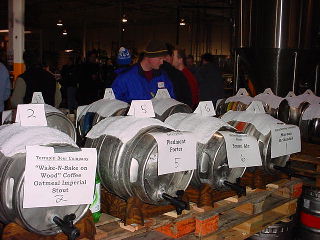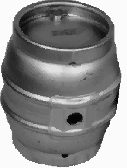|
|
Cask
ale (or
real ale) is young beer that has been placed in small, metal, English
casks called firkins. In the sealed firkin the beer undergoes a
special conditioning process whereby the yeast produces carbonation and
wonderful flavor components and then settles to the bottom of the
cask. After a time, excess carbonation is vented and a serving
tap is hammered into a spout on the cask. The beer is served
without pasteurization or additions of artificial carbon dioxide or
other gasses. This is soft, fresh, living beer the way it was
meant to be served!
|
|
|
Tips on how to condition and serve a good cask ale:
- Clean and sanitize
the empty cask thoroughly with caustic, and be sure to brush and clean both
openings. Seal the small opening (keystone) at the end of the cask first with a small keystone bung.
- Using the large
center opening, add your beer to
the cask at the end of primary fermentation with enough sugar and yeast
to carbonate it lightly. If the beer has little to no residual
sugar, about 7 ounces of dextrose corn sugar boiled in a little water
will lightly carbonate a
10.8 US
gallon firkin (like a homebrew bottle). Fill the cask all the way and
remember to use a fining of your choice (gelatin works well). If
a dry-hop bag is added to the cask, do NOT leave strings or any portion
of the bag sticking outside the bung, as this is a pathway for
infection. Hammer in a sanitized large bung (shive). Keep the cask out
at cool room temperature in order to naturally carbonate, like a big
homebrew bottle.
- High-gravity beers
can condition at 55-65 degrees F for weeks. A 5% ABV
ale should be ready to spile in 7-10 days or
less.
- When you think the
beer has conditioned and built up some carbonation (like in a homebrew
bottle), set it up in a cooler level and
horizontally on its wooden platform (stillage) with the large, center
bung straight up toward the ceiling. Keep the cask
in horizontal stillage in a cooler for at least two days to allow
sediment to settle into the cask's belly. Don't move, roll or disturb
the cask.
- Wooden venting pegs (SPILES) come in short, soft
versions and longer, harder varieties. Soft spiles vent the cask
quickly and can sometimes dredge up sediment. Hard spiles vent slowly
and gently. I prefer to simply use a hard spile over 24 hours in the cooler to release excess pressure from inside the cask.
- The night before tapping, spray the large bung (shive)
with sanitizer in the cooler and hammer in a hard spile with 2/3 of the
spile sticking out of the cask. This will vent excessive pressure.
- An hour or two before tapping, have two strong people
lift the cask out of the cooler and place on the stillage stand on the
bar, still in horizontal position. Don't slosh or upright the cask
while moving, as this will stir up sediment. If you do NOT have a
wooden stillage stand, brace the cask on either side with wooden wedges
or heavy items to prevent the cask from rolling, and put a folded towel
under the REAR of the cask to get a gentle slope down toward the
tapping bung.
- Spray the end (smaller) bung with sanitizer. Make sure the tap is closed, and hammer the gravity tap
into the middle of the smaller bung with a rubber or wooden mallet.
Hammer it in about halfway. Keep the tap straight in your hand, and
keep your eye on the end of the tap. Don't smack the tap's valve with
the hammer - it will break. The hard spile remains in place.
- Get a bucket and hold under the tap. Open the tap and
pour beer into the bucket until the beer flow slows way down and/or
stops due to a vacuum. Turn off the tap and remove the hard spile with
a pair of pliers. Put a wet cloth over the cask to cover the spile
hole, keep the cask cool, and prevent fruit flies from crawling in.
- Pour the pints with the spile removed. Otherwise, a vacuum will form, and beer will not flow.
- Try to serve the whole cask while the cask still is
chilled from the cooler (no warmer than 55 degrees F). Serving cask ale
at room temperature is NEVER a good thing.
- When empty, upright the cask and gently rock the tap
to remove. Soak the tap in sanitizer. Pull out the plastic bung
carefully with a large screwdriver or shive extractor bar.
Don't scratch the inside of the cask bungs with metal toos. Put a cork
into the small bung and clean and soak the cask with caustic. When
clean, gently remove the cork and wooden bung with a screwdriver and
store the clean cask until needed again.
MORE DETAILS...
- Please remember that putting filtered bright beer with CO2 into a cask
doesn't constitute cask ale. All cask ales should be placed into casks
unfiltered with a little residual sugar and yeast to naturally carbonate the
beer in the cask. All cask ales should have sediment. If a cask is rolled out,
immediately tapped, and pours clear, it is not real cask ale.
- Give cask ales plenty of time to drop bright and form the sediment
layer. Don't rush things.
- Use good finings - isinglass, gelatin, etc. And condition casks at cool
temperatures (60-65 degrees F). Warm conditioning temps make for exploding
casks. Cask ales can't be shipped in warm months on non-refrigerated trucks.
- Cask ale can't be delivered and served the same day. Please never do this.
A cask should have at least 24-48 hours in very cool horizontal stillage
position before being served. If you cask arrives the day of tapping,
immediately set the cask in cool stillage position, and put the tapping off
until the next day or next week. This is better than serving murky beer.
- Casks should never be up-righted or jostled prior to serving. Stable
stillage position is important.
- Don't soft spile just a few minutes before trying to serve. This often is
not enough time. Vigorous soft spiling also dredges up sediment and make the
beer cloudy.
- Wooden hard spiles from UKBrewing.com will typically vent
pressure above 5 PSI or so - just right for a cask. But the HARD spiles take 1-2
days to fully vent the cask down to 5 or less PSI. Soft spiles vent faster, but
do dredge up sediment at times. If you have a day or two, just use a hard spile
to vent -- 90% of the time, this works well. If any spile is blocked by a hop
bag or leaf hops, it will vent MUCH slower or stop all-together.
- Murky, cloudy cask beer is no fun. This is a sign that the beer might still
be working (too much residual sugar) and hasn't been given time to drop bright.
It's also possible that the cask was up-righted or shaken before serving.
Infection could also the issue, but taste and aroma will give this away.
- Be sure casks are served no warmer that 55 degrees F. Cask ale should never
be served warm.
- Don't seal the large top bung (shive) with a hop sock string sticking out.
This can lead to infection, and the bag will float near the bung and make
spiling and venting problematic. It's best to put the hop bag into the cask with
a bit of clean stainless steel to make the hop bag end up in the belly of the
cask (safely away from either of the two bungs).
- If a gravity tap plugs up with sediment during serving, it means that the
cask has not had time to drop bright. Never upright the cask and pull out the
tap to clear the blockage (your cask will be ruined by sediment). Rather, have
some clip corks on hand. Keep the cask in horizontal position, put the hard
spile back in, put a bucket under the tap, rock the tap gently by hand to remove
it, and slap in the clip cork to seal (you will just loose a little beer).
Unscrew the two pieces of the gravity tap, clear the tap screen (or temporarily
remove the screen), and hammer the tap back without removing the clip cork - the
soft clip cork just gets hammered into the cask. This way, a seal is
maintained, and very little beer is lost.

|
For casks and all supplies, check out UK BREWING SUPPLIES, www.ukbrewing.com, phone
717-560-9447.
I hope all this is clear, and please feel free to E-MAIL me with any
questions or suggestions. I encourage you will prepare and serve
a
cask ale soon -- your customers will love it! |
|




